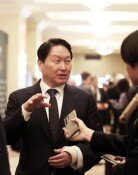[Editorial] BOK Must Act Faster With Measures
[Editorial] BOK Must Act Faster With Measures
Posted October. 28, 2008 09:12,
The Bank of Korea yesterday slashed its key interest rate a record 75 basis points, much larger than what the market had expected, and decided to inject five trillion to 10 trillion won into the market by directly buying bonds issued by commercial banks. The decision to dramatically lower the key interest rate came 18 days after the last cut of 25 basis points Oct. 9. The bank apparently judged that the economic crisis is spiraling out of control faster than expected. This cut also showed the previous one was insufficient to placate the market. Purchasing bonds issued by commercial banks is part of the governments attempt to lower interest rates on home loans by providing capital to banks. The announcement came a week after the central bank began considering the option at the request of banks and the government.
The belated aggressive measure halted the decline in the stock market and lowered home loan interest rates. Had it come sooner, it could have reduced market shock and cost for policy implementation. Prompt decision-making and effective implementation are keys to tackling the global financial crisis. The U.S. Federal Reserve Board announced Oct. 7 the injection of capital into the U.S. market by directly purchasing commercial papers without banks. Back in the 1929 Great Depression, the Fed had gained congressional approval to provide capital to anyone in abnormal and desperate conditions. The Fed implemented that authority for the first time since the 1940s when it approved micro-lending to nonfinancial institutions twice. Given the dire situation of the financial crisis, the Fed prioritized prompt and proactive reaction to the markets needs over tradition and saving face as the central bank of the United States.
The Bank of Korea should have done the same. Instead of being tied down by policy tools (lowering the key interest rate), it should have responded quickly to the markets needs to achieve its policy goals (reducing interest rates on home loans). The government failed to come up with timely measures or resorted to numerous makeshift plans, including helping small businesses deal with losses from KIKO currency options or addressing speculation in the foreign exchange market. If the government makes the same mistakes with the real economy, the consequences will be disastrous.
President Lee Myung-bak pledged in a speech to the National Assembly proactive measures to provide sufficient market liquidity until the crisis is over. The public will be free of anxiety only after his words are put into action. Indiscreet optimism or empty slogans will undermine the governments authority and amplify fear in the market. If the world has a misleading view of Koreas situation, the government must step up to clear any misunderstanding immediately and address factors reminiscent of the Asian financial crisis by restoring the current account surplus.
In times of crisis, market conditions become abnormal and delivery and implementation of policies become different. Therefore only measures that respond to the needs of the market will work instead of those based on impractical theories.







